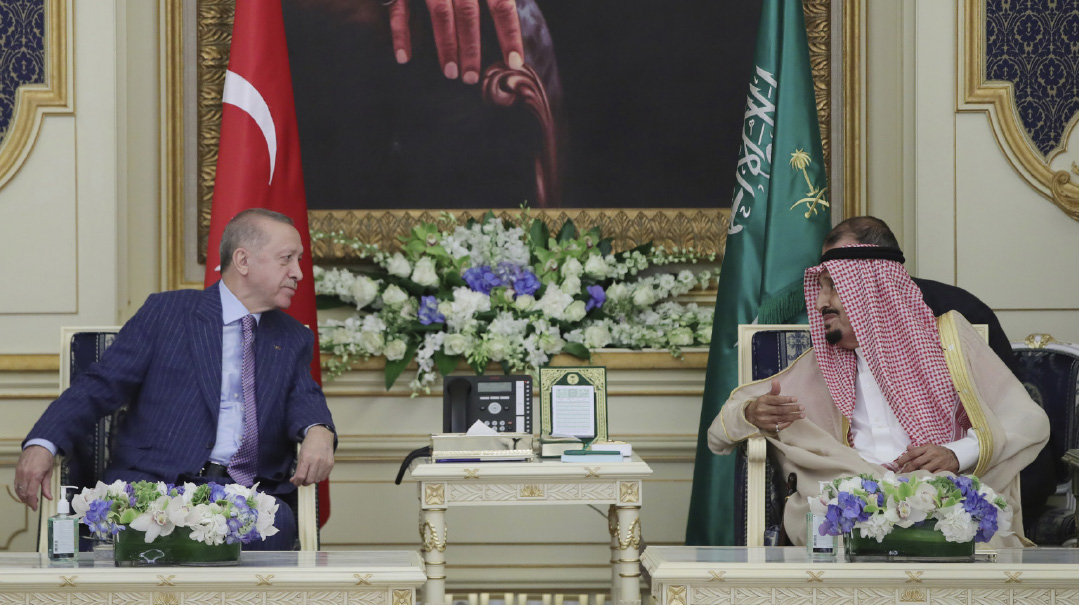Trump’s Gaza Plan
| February 11, 2025What do the Strip’s denizens think of Trump’s daring plan?

“Most of the people I know want to get out of here, and yet everyone I know is angry about what Trump said. Only Al-lah can understand these Gazans. Seriously.”
Such were the thoughts last week of Hadi, a well-known Palestinian activist and Gaza resident. They capture the essence of the Gazan reaction to the emigration plan presented last week by US president Donald Trump.
Hadi is far from an Israel supporter. Not at all. She is a Hamas supporter who responded enthusiastically to the online images of the October 7 massacre and supported Hamas’s call for a “renewed return to the land.” She even added “7oct” to her social media username to show her solidarity with the terrorists.
But Hadi also represents another voice — that of Gazan residents who are weary of loss and war and who still love themselves slightly more than they hate Jews. They just want a normal life, but they know that’s something that can only be found beyond the borders of the Gaza Strip.
Last week, US president Donald Trump presented his plan for the future of the Gaza Strip and its residents. According to the plan, once the fighting ends and Hamas’s military power is dismantled, the Gaza Strip will be placed under US civil administration, which will oversee a massive reconstruction effort. At the same time, the US government will encourage Gazans to emigrate by any means possible. Several potential destinations have already been suggested to absorb the Strip’s two million residents.
The plan has met with outright opposition from Arab countries, but the Americans — and quietly, the Israelis as well — are determined to push it forward. Will it actually happen? That depends to a large extent on the Gazans themselves.
A former senior official in the IDF Southern Command who is well acquainted with the Gazan population told me this week: “The Gazans themselves want to leave. If you had opened the gates on October 6, 2023, the Strip would have emptied out within three hours. On the other hand, though, they don’t want to feel like they’re being shoved out.
“In no case will we see the expulsion of two million Gazans,” he says. “If they decide to stay, no one will force them out. The only question is what they themselves plan to do. Whether voluntary emigration occurs or not — that is something only the residents of Gaza can answer.”
If this was a question only Gaza residents could answer, our assignment was clear. So we went to ask them.
It’s not as risky as it sounds. Gazans have flooded social media and are more than willing to engage. Some are obviously less willing than others to chat with Israelis, and some are understandably wary of identifying themselves. But they all have opinions.
Dreaming of Ashdod
The first one we chatted with was Samah, 26, a resident of southern Gaza who longs to leave and start a new life elsewhere.
“Since the day I was born, I have never left the Gaza Strip,” he says. “I have never entered Israel, or Egypt either.”
Samah’s war story is similar to that of most Gazan residents. “The day after October 7, my brother came and said the Israelis were going to enter Rafah and we should evacuate. We packed what we could and left for Gaza City, where we have cousins. After about a week, there was a feeling that the IDF was afraid to enter Gaza, and people started saying that maybe there wouldn’t be an invasion. So we returned to Rafah for a few days. Then, once again, we had to leave for central Gaza.”
Then Operations Swords of Iron began, and everything changed. Every few days, his family was forced to relocate.
“At first, we stayed with relatives and friends, but they also became refugees, and we had nowhere left to stay. So we set up a tent, but even that had to be moved around constantly to different places.
“This land is important to us. When we saw the images on October 7, we already imagined the house we would build in Ashdod. I never thought that a year and a half later, I would be waiting for the moment when I could leave Gaza and never return.
“Understand,” Samah says, “the land is not just a narrative. It is an ideology. It’s what I heard about from the moment I was born. It’s what I aspired to from the moment I learned to think. But no ideology is strong enough to withstand the sight of three hungry, shivering children. No narrative holds up against a bombed house and a tent blown away by the wind. Right now, we don’t care about anything anymore. They took our pride, they took our honor, they took our home — at least let us live.”
There are those who try to create a false impression of mass Gazan opposition to the emigration plan, and it’s not hard to understand who is behind it.
“It’s Hamas — you won’t hear anyone else, not a single other resident here, speaking like that,” says another Gazan who, unsurprisingly, preferred to remain anonymous.
“What is Hamas?” he adds. “Hamas is my hungry children, who tomorrow will carry out an attack for 200 shekels. The Nukhba forces are the neighbor’s son who took a Kalashnikov in exchange for a meal. That’s Hamas. If there are no residents left here, there will be no Hamas — and that’s what they fear.”
And that makes a certain amount of sense. Hamas is an idea, as former secretary of state Tony Blinken was fond of lecturing, and you can’t kill an idea. But on the other hand, if there are no people left in the Gaza Strip, the idea has no foothold. There will be no one to act on it. Hamas will cease to exist.
Hamas Is Gaza
Many residents, however, still hate Jews and do not regret October 7 for a second — despite all the suffering they’ve endured.
“We once had a beautiful new house, and it was bombed — praise be to Al-lah,” wrote Ali, a Gaza resident who lost his home. “Al-lah will compensate us with good.
“Everything is a sacrifice for the resistance and for the young fighters who defended us until their last drop of blood. A sacrifice for those we found dead in the hallway, with their equipment and weapons beside them.”
Another Gazan amplifies those ugly sentiments. “I lost a child, a brother, seven cousins, and dozens of friends and acquaintances. My house was bombed, I lost my car, and I haven’t eaten chocolate in a year and a half. But by Al-lah, I look at the pictures from the great liberation [October 7], and it was all worth it. I am ready to do it 1,000 more times until we expel them all.”
This interlocutor was not so happy about the ceasefire deal to free Israelis held captive by Hamas. Before the hostage release, he publicly pleaded online: “Ya Hamas, if the prisoners scheduled for release on Saturday are not disabled and in wheelchairs, we don’t want them to be freed. Either way, we are suffering — let them stay and suffer with us.”
The residents are Hamas, and Hamas is the residents. As long as Hamas exists in Gaza, it has two million members. Hamas leaders draw their strength from the suffering of Gazans, so they are obviously going to show no hint of flexibility toward an emigration plan that is primarily intended to benefit the masses under their control.
However, there are Gazans among the most diehard Hamas supporters who understand that their time has come, and their future — if they have one — is not in this desolate strip of land.
Ali Shareem, a Palestinian social media star, conducted a survey on his page that revealed surprising results. Among 4,000 Gazan respondents, more than 50% said they wanted to emigrate — “and they don’t care where to.”
But there are also some old-line Palestinian nationalists who oppose both Hamas and Trump’s emigration plan, and even demand the removal of Hamas to prevent the plan from being implemented. One of them is Hassan Hossam, a resident of central Gaza.
“If Hamas had an ounce of patriotism and sense of belonging to Palestine, now would be the best time to announce its withdrawal from the Palestinian political arena for good and transfer control of Gaza to the Palestinian Authority and the PLO, in order to block Trump’s project of eliminating the Palestinian issue and prevent him from having an excuse to implement it,” he declares.
“The continued presence of Hamas in the arena will give everyone an excuse to be swept along with the end of the project [of establishing a Palestinian state].”
No Longer Taboo
That kind of divide also spills over into the larger Palestinian society, irrespective of political or ideological lines.
“Look, we are not naive,” says Ahmad al-Masri, 42, a father of four from Rafah. “When they talk to us about ‘voluntary emigration,’ it’s exactly like saying, ‘Leave your home willingly, or we’ll destroy it.’ But I look at my children. My eldest son is 15, and he has never seen anything in his life except the Gaza Strip. He has no future here.”
Al-Masri, who lost his grocery store in a bombing, says he is already looking into emigration options. “I have a cousin in Turkey. He says it’s hard at first, but you can build a life. His children are in university; they have opportunities. Here? What is there here? Another war in a few years?”
In contrast, Hamed, who claims to be a teacher from northern Gaza, strongly opposes the idea of emigration. “This is exactly what they want,” he says angrily. “For us to leave, to give up our land. But where would we go? To be refugees in a foreign country? I was born here. My grandfather was born here. We have history, we have roots.
“Yes, the situation is hard right now,” he admits. “But it’s temporary. What is permanent is our right to this land. If we leave now, we will never return. Our children and grandchildren will grow up without knowing who they are and where they came from. I would rather die here than live as a refugee somewhere else.”
These opposing viewpoints reflect a sea change that has swept Gazan society.
“People are afraid to talk about it out loud,” says Ahmad, “but in private conversations, within families, this question comes up all the time. It’s no longer a taboo like it used to be.
“Families are being torn apart over this,” he adds. “I’ve seen an older brother who wants to take the whole family out, and a younger brother who accuses him of betrayal. A father who wants to stay, and a son begging him to think about the grandchildren’s future. It’s tearing families apart.”
The current war has accomplished something unprecedented: Even among the most radical supporters of terror, some Gazans are now willing to abandon the land.
“It’s not that people will abandon the struggle now, but they understand that first, they need to rebuild their lives,” he explains. “Before the residents returned to the north [of Gaza], everyone would tell you they wanted to stay. But people returned after a year and a half in tents, and saw with their own eyes that there was nothing to return to — maybe there was land, but no home on it. They realized that staying in Gaza meant living in a tent for many more years, until the next war. So what’s the point?
“This war has boosted national pride for many Palestinians,” he concludes. “Relatives from abroad called us on October 7, asking excitedly if they could finally return. But if, after Hamas managed to land such a heavy blow on the Israelis, and they are still the winners, and we still see no future here — what does that say?”
In the end, it will be the Gazans themselves who decide how much of Trump’s plan will be implemented. Today, many want to flee, while Hamas is working hard to push the narrative that they want to stay — actively taking steps to keep them there.
If American optimism is to be believed, Hamas won’t be able to maintain this charade for much longer.
(Originally featured in Mishpacha, Issue 1049)
Oops! We could not locate your form.







